About Mo Yan
Mo Yan, was born in 1955 in Gaomi Township in Shandong Province, a rural area that is the setting for much of his fiction. Mo Yan ("don't speak") is a pseudonym for Guan Moye on the advice of his parents as a school-age boy during the Mao era. The cultural revolution forced him to leave school at 12 and went to work in the fields, completing his education in the army. He published his first book in 1981, but found literary success in 1987 with Hong gaoliang jiazu (Red Sorghum), a novel made into an internationally successful movie by director Zhang Yimou, set against the horrific events that unfolded as Japan invaded China in the 1930s.
"He writes about peasantry, about life in the countryside, about people struggling to survive, struggling for their dignity, sometimes winning but most of the time losing," said permanent secretary of the Swedish Academy Peter Englund, announcing the win. "The basis for his books was laid when as a child he listened to folktales. The description magical realism has been used about him, but I think that is belittling him – this isn't something he's picked up from Gabriel García Márquez, but something which is very much his own. With the supernatural going in to the ordinary, he's an extremely original narrator."
Edited excerpt from the Guardian, Oct. 11, 2012, by Alison Flood
Howard Goldblatt taught modern Chinese literature and culture for more than a quarter of a century. He was a Research Professor of Chinese at the University of Notre Dame from 2002-2011 and is a translator of numerous works of contemporary Chinese (mainland China & Taiwan) fiction. Goldblatt translated the works of Chinese novelist and 2012 Nobel Prize in Literature winner Mo Yan, including six of Mo Yan's novels and collections of stories.
The Nobel Prize in Literature 2012 Mo Yan in media
The Nobel Prize in Literature 2012
Nobel Literature Winner Sparks Some Controversy (NPR Morning Edition, October 12, 2012)
China's Mo Yan wins Nobel literature prize (UPI NewsTrack, October 11, 2012)
A Meaty Tale, Carnivorous and Twisted (The New York Times, January 1, 2013)
A Chinese Laureate's Tale of Free Speech (The New York Times, December 19, 2012)
Mo Yan's Creative Space (The New York Times The Opion Pages, Octover 15, 2012)
English Translation
-
 Big breasts and wide hips : a novel translated from the Chinese
by
Call Number: PL2886.O1684 F3813 2004Publication Date: New York : Arcade Pub., 2004.In his latest novel, Mo Yan—arguably China’s most important contemporary literary voice—recreates the historical sweep and earthy exuberance of his much acclaimed novel Red Sorghum.
Big breasts and wide hips : a novel translated from the Chinese
by
Call Number: PL2886.O1684 F3813 2004Publication Date: New York : Arcade Pub., 2004.In his latest novel, Mo Yan—arguably China’s most important contemporary literary voice—recreates the historical sweep and earthy exuberance of his much acclaimed novel Red Sorghum. -
 Explosions and other stories
by
Call Number: PL2886.O1684 A28 1991Publication Date: Hong Kong : Research Centre for Translations, Chinese University of Hong Kong, c1991Explosions
Explosions and other stories
by
Call Number: PL2886.O1684 A28 1991Publication Date: Hong Kong : Research Centre for Translations, Chinese University of Hong Kong, c1991Explosions
The old gun
Flies
The flying ship
The amputee
The yellow-haired baby. -
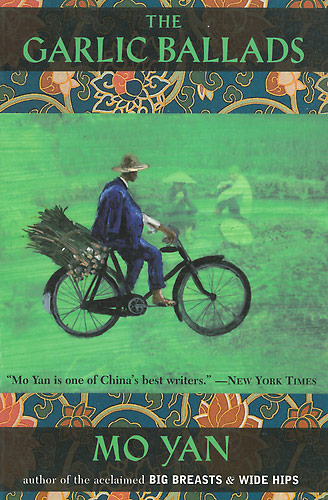 The Garlic Ballads
by
Call Number: PL2886.O1684 T513 1995Publication Date: New York : Viking, 1995290 p. ; 24 cm
The Garlic Ballads
by
Call Number: PL2886.O1684 T513 1995Publication Date: New York : Viking, 1995290 p. ; 24 cm -
 Life and death are wearing me out : a novel
by
Call Number: PL2886.O1684 S5413 2008Publication Date: New York : Arcade Pub., c2008viii, 540 p. ; 25 cm
Life and death are wearing me out : a novel
by
Call Number: PL2886.O1684 S5413 2008Publication Date: New York : Arcade Pub., c2008viii, 540 p. ; 25 cm -
 Pow!
by
Call Number: PL2886.O1684 S5513 2012Publication Date: London : Seagull Books, c2012386 p. ; 24 cm
Pow!
by
Call Number: PL2886.O1684 S5513 2012Publication Date: London : Seagull Books, c2012386 p. ; 24 cm -
 Red sorghum : a novel of China
by
Call Number: PL2886.O1684 H8613 1993Publication Date: New York : Viking, 1993359 p ; 24 cm
Red sorghum : a novel of China
by
Call Number: PL2886.O1684 H8613 1993Publication Date: New York : Viking, 1993359 p ; 24 cm -
 The republic of wine : a novel
by
Call Number: PL2886.O1684 J5813 2000Publication Date: New York : Arcade Pub., c2000v, 355 p. ; 25 cm
The republic of wine : a novel
by
Call Number: PL2886.O1684 J5813 2000Publication Date: New York : Arcade Pub., c2000v, 355 p. ; 25 cm -
 Sandalwood death : a novel
by
Call Number: PL2886.O1684 T3613 2013Publication Date: Norman : University of Oklahoma Press, c2013x, 409 p. ; 23 cm
Sandalwood death : a novel
by
Call Number: PL2886.O1684 T3613 2013Publication Date: Norman : University of Oklahoma Press, c2013x, 409 p. ; 23 cm -
 Shifu, you’ll do anything for a laugh
by
Call Number: PL2886.O1684 S513 2001Publication Date: New York : Arcade Pub., 2001xxii, 189 p. ; 22 cm
Shifu, you’ll do anything for a laugh
by
Call Number: PL2886.O1684 S513 2001Publication Date: New York : Arcade Pub., 2001xxii, 189 p. ; 22 cm
Chinese Language Books
-
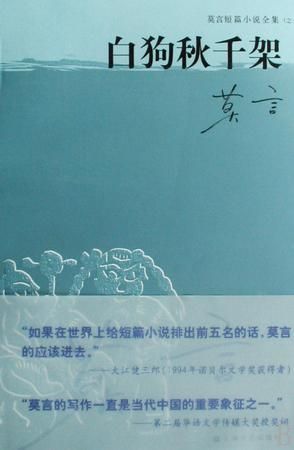 Bai gou qiu qian jia 白狗秋千架
by
Call Number: PL2886.O1684 B35 2009Publication Date: Shanghai : Shanghai wen yi chu ban she, 2009莫言作品系列
Bai gou qiu qian jia 白狗秋千架
by
Call Number: PL2886.O1684 B35 2009Publication Date: Shanghai : Shanghai wen yi chu ban she, 2009莫言作品系列
莫言短篇小说全集 ; 1
莫言, 1955-. 莫言作品系列.
莫言, 1955-. 莫言短篇小说全集 ; 1 -
 Bai mian hua 白棉花
by
Call Number: PL2886.O1684 P3454 1991Publication Date: Beijing : Hua yi chu ban she : Xin hua shu dian Beijing fa xing suo jing xiao, 1991中囯当代著名作家新作大系
Bai mian hua 白棉花
by
Call Number: PL2886.O1684 P3454 1991Publication Date: Beijing : Hua yi chu ban she : Xin hua shu dian Beijing fa xing suo jing xiao, 1991中囯当代著名作家新作大系 -
 Bian 变
by
Publication Date: Beijing Shi : Hai tun chu ban she, 2010
Bian 变
by
Publication Date: Beijing Shi : Hai tun chu ban she, 2010 -
Gu ma de bao dao 姑媽的寶刀 byCall Number: PL2886.O1684 G8 2012Publication Date: Shanghai : Shanghai wen yi chu ban she, 2012253 p. ; 21 cm
-
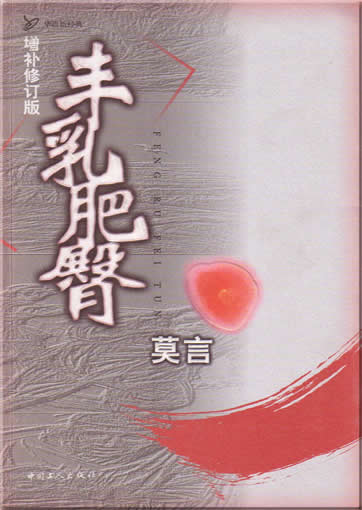 Feng ru fei tun 丰乳肥臀
by
Call Number: PL2886.O1684 F48 1996Publication Date: Beijing : Zuo jia chu ban she : Jing xiao Xin hua shu dian Beijing fa xing suo, 1995
Feng ru fei tun 丰乳肥臀
by
Call Number: PL2886.O1684 F48 1996Publication Date: Beijing : Zuo jia chu ban she : Jing xiao Xin hua shu dian Beijing fa xing suo, 1995 -
 Happy times a Sunflower presentation
by
Call Number: DVD PN1997 .X562 2000Publication Date: [Los Angeles, Calif.] : 20th Century Fox Home Entertainment, c20021 videodisc (ca. 106 min.) : sd., col. ; 4 3/4 in
Happy times a Sunflower presentation
by
Call Number: DVD PN1997 .X562 2000Publication Date: [Los Angeles, Calif.] : 20th Century Fox Home Entertainment, c20021 videodisc (ca. 106 min.) : sd., col. ; 4 3/4 in -
 Hong gao liang jia zu 红高梁家族
by
Call Number: PL2886.O1684 H66 2012Publication Date: Shanghai : Shanghai wen yi chu ban she, 20127, 364 p. ; 23 cm
Hong gao liang jia zu 红高梁家族
by
Call Number: PL2886.O1684 H66 2012Publication Date: Shanghai : Shanghai wen yi chu ban she, 20127, 364 p. ; 23 cm -
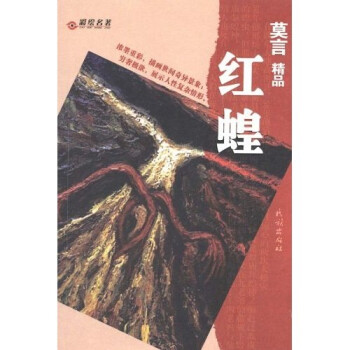 Hong huang 红蝗
by
Call Number: PL2886.O1684 H66 2004Publication Date: Beijing Shi : Min zu chu ban she, 2004144 p. : col. ill. ; 21 cm
Hong huang 红蝗
by
Call Number: PL2886.O1684 H66 2004Publication Date: Beijing Shi : Min zu chu ban she, 2004144 p. : col. ill. ; 21 cm -
 Hong shu lin 红树林
by
Call Number: PL2886.O1684 H67 2012Publication Date: Shanghai : Shanghai wen yi chu ban she, 20127, 342 p. ; 23 cm
Hong shu lin 红树林
by
Call Number: PL2886.O1684 H67 2012Publication Date: Shanghai : Shanghai wen yi chu ban she, 20127, 342 p. ; 23 cm -
 Huai bao xian hua de nü ren 懷抱鮮花的女人
by
Call Number: PL2886.O1684 H83 2012Publication Date: Shanghai : Shanghai wen yi chu ban she, 20122, 475 p. ; 23 cm
Huai bao xian hua de nü ren 懷抱鮮花的女人
by
Call Number: PL2886.O1684 H83 2012Publication Date: Shanghai : Shanghai wen yi chu ban she, 20122, 475 p. ; 23 cm -
 Huan le 欢乐
by
Call Number: PL2886.O1684 H833 2012Publication Date: Shanghai : Shanghai wen yi chu ban she, 20122, 420 p. ; 23 cm
Huan le 欢乐
by
Call Number: PL2886.O1684 H833 2012Publication Date: Shanghai : Shanghai wen yi chu ban she, 20122, 420 p. ; 23 cm -
 Hui chang ge de qiang 会唱歌的墙
by
Call Number: PL2886.O1684 H85 2005Publication Date: Beijing : Zuo jia chu ban she, 20053, 313 p. : ports. ; 22cm
Hui chang ge de qiang 会唱歌的墙
by
Call Number: PL2886.O1684 H85 2005Publication Date: Beijing : Zuo jia chu ban she, 20053, 313 p. : ports. ; 22cm -
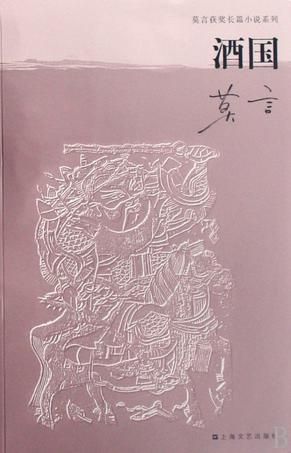 Jiu guo 酒国
by
Call Number: PL2886.O1684 J5 2012Publication Date: Shanghai : Shanghai wen yi chu ban she, 20127, 345 p. ; 23 cm
Jiu guo 酒国
by
Call Number: PL2886.O1684 J5 2012Publication Date: Shanghai : Shanghai wen yi chu ban she, 20127, 345 p. ; 23 cm -
 Lao qiang, bao dao 老枪・宝刀
by
Call Number: PL2886.O1684 L36 2000Publication Date: Shanghai : Shanghai wen yi chu ban she, 20002, 276 p. ; 21 cm
Lao qiang, bao dao 老枪・宝刀
by
Call Number: PL2886.O1684 L36 2000Publication Date: Shanghai : Shanghai wen yi chu ban she, 20002, 276 p. ; 21 cm -
 Ling ting yu zhou de ge chang 聆听宇宙的歌唱
by
Call Number: PL2886.O1684 L56 2012Publication Date: Beijing Shi : Zhongguo wen shi chu ban she, 2012[5], 249 p. ; 23 cm
Ling ting yu zhou de ge chang 聆听宇宙的歌唱
by
Call Number: PL2886.O1684 L56 2012Publication Date: Beijing Shi : Zhongguo wen shi chu ban she, 2012[5], 249 p. ; 23 cm -
 Mao shi hui cui 猫事荟萃
by
Call Number: PL2886.O1684 M26 1994Publication Date: Beijing : Xin shi jie chu ban she, 19945, 223 p. ; 20 cm
Mao shi hui cui 猫事荟萃
by
Call Number: PL2886.O1684 M26 1994Publication Date: Beijing : Xin shi jie chu ban she, 19945, 223 p. ; 20 cm -
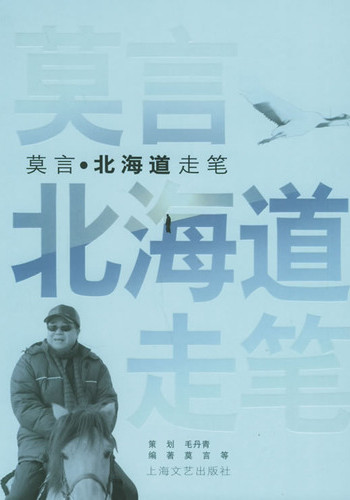 Mo Yan, Beihaidao zou bi 莫言・北海道走笔
by
Call Number: DS894.22 .M68 2006Publication Date: Shanghai : Shanghai wen yi chu ban she, 2006181 p. : col. ill. ; 26 cm
Mo Yan, Beihaidao zou bi 莫言・北海道走笔
by
Call Number: DS894.22 .M68 2006Publication Date: Shanghai : Shanghai wen yi chu ban she, 2006181 p. : col. ill. ; 26 cm -
 Mo Yan dui hua xin lu 莫言对话新录
by
Call Number: PL2886.O1684 M628 2010Publication Date: Beijing Shi : Wen hua yi shu chu ban she, 20102, 532 p. ; 24 cm
Mo Yan dui hua xin lu 莫言对话新录
by
Call Number: PL2886.O1684 M628 2010Publication Date: Beijing Shi : Wen hua yi shu chu ban she, 20102, 532 p. ; 24 cm -
 Mo Yan jiang yan xin pian 莫言讲演新篇
by
Call Number: PL 2886.O1684 A15 2010Publication Date: Beijing Shi : Wen hua yi shu chu ban she, 20103, 372 p. ; 24 cm
Mo Yan jiang yan xin pian 莫言讲演新篇
by
Call Number: PL 2886.O1684 A15 2010Publication Date: Beijing Shi : Wen hua yi shu chu ban she, 20103, 372 p. ; 24 cm -
 Mo Yan jing xuan ji 莫言精选集
by
Call Number: PL2886.O1684 A6 2011Publication Date: Beijing Shi : Beijing Yanshan chu ban she, 2011391 p. ; 20 cm
Mo Yan jing xuan ji 莫言精选集
by
Call Number: PL2886.O1684 A6 2011Publication Date: Beijing Shi : Beijing Yanshan chu ban she, 2011391 p. ; 20 cm -
 Mo Yan san wen xin bian 莫言散文新编
by
Call Number: PL2886.O1684 A6 2010Publication Date: Beijing Shi : Wen hua yi shu chu ban she, 20103, 271 p. ; 24 cm
Mo Yan san wen xin bian 莫言散文新编
by
Call Number: PL2886.O1684 A6 2010Publication Date: Beijing Shi : Wen hua yi shu chu ban she, 20103, 271 p. ; 24 cm -
 Mo Yan Wang Yao dui hua lu 莫言王尧对话录
by
Call Number: PL2264 .M68 2003Publication Date: Suzhou Shi : Suzhou da xue chu ban she, 2003iv, 308 p., [1] p. of plates : ports. ; 21 cm
Mo Yan Wang Yao dui hua lu 莫言王尧对话录
by
Call Number: PL2264 .M68 2003Publication Date: Suzhou Shi : Suzhou da xue chu ban she, 2003iv, 308 p., [1] p. of plates : ports. ; 21 cm -
 Mo Yan yan jiu zi liao 莫言研究资料
by
Call Number: PL2886.O1684 Z763 2005Publication Date: Tianjin Shi : Tianjin ren min chu ban she, 20055, 625 p. : ill. (some col.) ; 21 cm
Mo Yan yan jiu zi liao 莫言研究资料
by
Call Number: PL2886.O1684 Z763 2005Publication Date: Tianjin Shi : Tianjin ren min chu ban she, 20055, 625 p. : ill. (some col.) ; 21 cm -
 Mo Yan zi xuan ji 莫言自选集
by
Call Number: PL2886.O1684 A6 2009Publication Date: Haikou Shi : Hainan chu ban she, 20093, 2, 723 p. ; 24 cm
Mo Yan zi xuan ji 莫言自选集
by
Call Number: PL2886.O1684 A6 2009Publication Date: Haikou Shi : Hainan chu ban she, 20093, 2, 723 p. ; 24 cm -
Mo Yan zuo pin jing xuan 莫言作品精选 by
Call Number: PL2886.O1684 A6 2005Publication Date: Wuhan Shi : Chang Jiang wen yi chu ban she, 20051, 359 p. ; 23 cm. -
 Niu 牛
by
Call Number: PL2886.O1684 N5 2004Publication Date: Beijing Shi : Min zu chu ban she, 2004111 p. : col. ill. ; 21 cm
Niu 牛
by
Call Number: PL2886.O1684 N5 2004Publication Date: Beijing Shi : Min zu chu ban she, 2004111 p. : col. ill. ; 21 cm -
 Nuan 暖
by
Call Number: DVD PN1997.2 .N8 2004Publication Date: Guangzhou : Heilongjiang wen hua yin xiang chu ban sheGuangdong fa xing bu, 20041 videodisc (90 min.) : sd., col. ; 4 3/4 in
Nuan 暖
by
Call Number: DVD PN1997.2 .N8 2004Publication Date: Guangzhou : Heilongjiang wen hua yin xiang chu ban sheGuangdong fa xing bu, 20041 videodisc (90 min.) : sd., col. ; 4 3/4 in -
Shen liao : Mo Yan zui xin zhong duan pian xiao shuo xuan 神聊 : 莫言最新中短篇小说选 byCall Number: PL2886.O1684 S47 1993Publication Date: [Beijing] : Beijing shi fan da xue chu ban she, 19932, 3, 3, 364 p. ; 21 cm
-
 Sheng si pi lao 生死疲劳
by
Call Number: PL2886.O1684 S435 2006Publication Date: Beijing : Zuo jia chu ban she, 20066, 540 p. : col. ill. ; 23 cm
Sheng si pi lao 生死疲劳
by
Call Number: PL2886.O1684 S435 2006Publication Date: Beijing : Zuo jia chu ban she, 20066, 540 p. : col. ill. ; 23 cm -
 Shi cao jia zu 食草家族
by
Call Number: PL2886.O1684 C36 2005Publication Date: Shanghai : Shanghai wen yi chu ban she, 2005349 p. ; 21 cm
Shi cao jia zu 食草家族
by
Call Number: PL2886.O1684 C36 2005Publication Date: Shanghai : Shanghai wen yi chu ban she, 2005349 p. ; 21 cm -
 Shi fu yue lai yue you mo 师傅越来越幽默
by
Call Number: PL2886.O1684 S5513 2012Publication Date: Shanghai : Shanghai wen yi chu ban she, 20122, 405 p. ; 23 cm
Shi fu yue lai yue you mo 师傅越来越幽默
by
Call Number: PL2886.O1684 S5513 2012Publication Date: Shanghai : Shanghai wen yi chu ban she, 20122, 405 p. ; 23 cm -
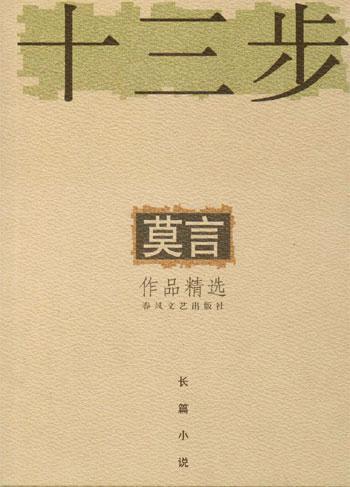 Shi san bu 十三步
by
Call Number: PL2886.O1684 S45 2012Publication Date: Shanghai : Shanghai wen yi chu ban she, 20127, 325 p. ; 23 cm
Shi san bu 十三步
by
Call Number: PL2886.O1684 S45 2012Publication Date: Shanghai : Shanghai wen yi chu ban she, 20127, 325 p. ; 23 cm -
 Si shi yi pao 四十一炮
by
Call Number: PL2886.O1684 S57 2012Publication Date: Shanghai : Shanghai wen yi chu ban she, 20127, 3, 402 p. ; 23 cm
Si shi yi pao 四十一炮
by
Call Number: PL2886.O1684 S57 2012Publication Date: Shanghai : Shanghai wen yi chu ban she, 20127, 3, 402 p. ; 23 cm -
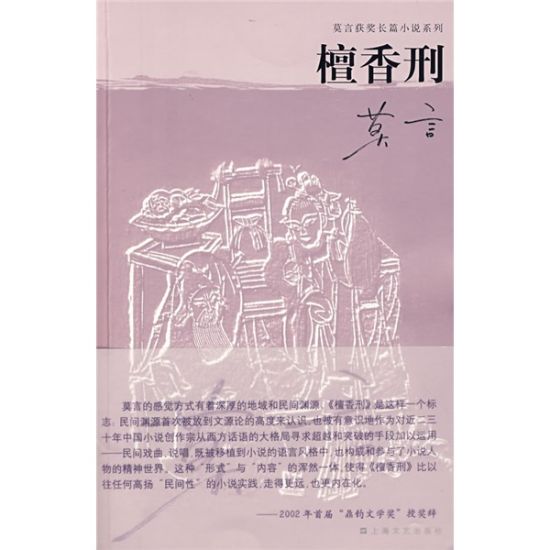 Tan xiang xing 檀香刑
by
Call Number: PL2886.O1684 T36 2012Publication Date: Shanghai : Shanghai wen yi chu ban she, 20127, 2, 418 p. ; 23 cm
Tan xiang xing 檀香刑
by
Call Number: PL2886.O1684 T36 2012Publication Date: Shanghai : Shanghai wen yi chu ban she, 20127, 2, 418 p. ; 23 cm -
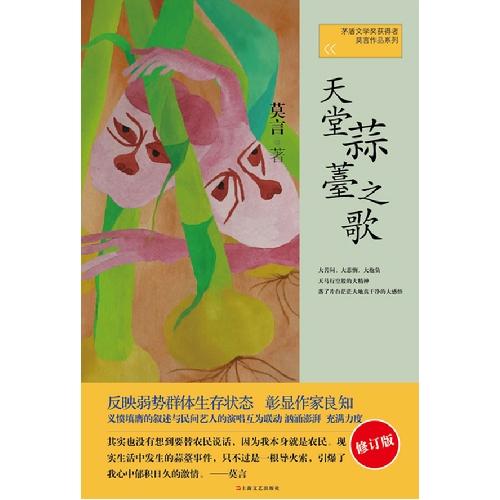 Tian tang suan tai zhi ge 天堂蒜薹之歌
by
Call Number: PL2886.O1684 T535 2012Publication Date: Shanghai : Shanghai wen yi chu ban she, 20127, 331 p. ; 23 cm
Tian tang suan tai zhi ge 天堂蒜薹之歌
by
Call Number: PL2886.O1684 T535 2012Publication Date: Shanghai : Shanghai wen yi chu ban she, 20127, 331 p. ; 23 cm -
 Tou ming di hong luo bo 透明的紅蘿蔔
by
Call Number: PL2886.O1684 T6 1989Publication Date: Taibei Shi : Lin bai chu ban she, [min guo] 78 [1989]297 p. : port. ; 21 cm.
Tou ming di hong luo bo 透明的紅蘿蔔
by
Call Number: PL2886.O1684 T6 1989Publication Date: Taibei Shi : Lin bai chu ban she, [min guo] 78 [1989]297 p. : port. ; 21 cm. -
 Wa 蛙
by
Call Number: PL2886.O1684 W327 2012Publication Date: Shanghai : Shanghai wen yi chu ban she, 2012288 p. ; 24 cm.
Wa 蛙
by
Call Number: PL2886.O1684 W327 2012Publication Date: Shanghai : Shanghai wen yi chu ban she, 2012288 p. ; 24 cm. -
 Wo de Gaomi : Mo Yan san wen juan. Zuo jia yu gu xiang
by
Call Number: PL2886.O1684 W6 2011Publication Date: Beijing : Zhongguo qing nian chu ban she, 2011276 p., [14] p. of plates : ill. ; 21 cm
Wo de Gaomi : Mo Yan san wen juan. Zuo jia yu gu xiang
by
Call Number: PL2886.O1684 W6 2011Publication Date: Beijing : Zhongguo qing nian chu ban she, 2011276 p., [14] p. of plates : ill. ; 21 cm -
 Xiao shuo zai xie wo : Mo Yan yan jiang ji 小說在寫我 : 莫言演講集
by
Call Number: PL2886.O1684 M68 2004Publication Date: Taibei Shi : Mai tian chu ban, 2004252 p. ; 21 cm
Xiao shuo zai xie wo : Mo Yan yan jiang ji 小說在寫我 : 莫言演講集
by
Call Number: PL2886.O1684 M68 2004Publication Date: Taibei Shi : Mai tian chu ban, 2004252 p. ; 21 cm -
 Xue xi Pu Songling : Mo Yan xiao shuo juan. Zuo jia yu gu xiang 学习蒲松龄 : 莫言小说卷. 作家与故
by
Call Number: PL2886.O1684 X84 2011Publication Date: Beijing : Zhongguo qing nian chu ban she, 2011302 p., [12] p. of plates : ill. ; 21 cm
Xue xi Pu Songling : Mo Yan xiao shuo juan. Zuo jia yu gu xiang 学习蒲松龄 : 莫言小说卷. 作家与故
by
Call Number: PL2886.O1684 X84 2011Publication Date: Beijing : Zhongguo qing nian chu ban she, 2011302 p., [12] p. of plates : ill. ; 21 cm -
 Yu da shi yue hui 与大师约会
by
Call Number: PL2886.O1684 Y8 2009Publication Date: Shanghai : Shanghai wen yi chu ban she, 20093, 507 p. : ports. ; 23 cm
Yu da shi yue hui 与大师约会
by
Call Number: PL2886.O1684 Y8 2009Publication Date: Shanghai : Shanghai wen yi chu ban she, 20093, 507 p. : ports. ; 23 cm -
 Zhan you chong feng 战友重逢
by
Call Number: PL2886.O1684 Z43 2004Publication Date: Beijing Shi : Min zu chu ban she, 2004128 p., [8] leaves of plates : col. ill. ; 21 cm
Zhan you chong feng 战友重逢
by
Call Number: PL2886.O1684 Z43 2004Publication Date: Beijing Shi : Min zu chu ban she, 2004128 p., [8] leaves of plates : col. ill. ; 21 cm -
 Zhu lu 筑路
by
Call Number: PL2886.O1684 Z48 2004Publication Date: Beijing Shi : Min zu chu ban she, 2004112 p., [8] leaves of plates : col. ill. ; 21 cm
Zhu lu 筑路
by
Call Number: PL2886.O1684 Z48 2004Publication Date: Beijing Shi : Min zu chu ban she, 2004112 p., [8] leaves of plates : col. ill. ; 21 cm